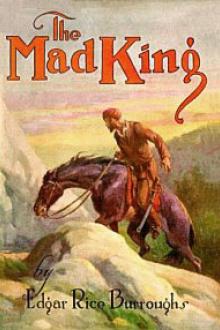The Mad King by Edgar Rice Burroughs (feel good books TXT) 📕

- Author: Edgar Rice Burroughs
- Performer: -
Book online «The Mad King by Edgar Rice Burroughs (feel good books TXT) 📕». Author Edgar Rice Burroughs
“Sire! the Von der Tanns have always been loyal to the house of Rubinroth. And but a single thing rises superior within their breasts to that loyalty, and that is their loyalty to Lutha.” He paused for an instant before concluding. “And I, sire, am a Von der Tann.”
There could be no mistaking the old man’s meaning. So long as Leopold was loyal to his people and their interests Ludwig von der Tann would be loyal to Leopold. The king was cowed. He was very much afraid of this grim old warrior. He chafed beneath his censure.
“You are always scolding me,” he cried irritably. “I am getting tired of it. And now you threaten me. Do you call that loyalty? Do you call it loyalty to refuse to compel your daughter to keep her plighted troth? If you wish to prove your loyalty command the Princess Emma to fulfil the promise you made my father—command her to wed me at once.”
Von der Tann looked the king straight in the eyes.
“I cannot do that,” he said. “She has told me that she will kill herself rather than wed with your majesty. She is all I have left, sire. What good would be accomplished by robbing me of her if you could not gain her by the act? Win her confidence and love, sire. It may be done. Thus only may happiness result to you and to her.”
“You see,” exclaimed the king, “what your loyalty amounts to! I believe that you are saving her for the impostor—I have heard as much hinted at before this. Nor do I doubt that she would gladly connive with the fellow if she thought there was a chance of his seizing the throne.”
Von der Tann paled. For the first time righteous indignation and anger got the better of him. He took a step toward the king.
“Stop!” he commanded. “No man, not even my king, may speak such words to a Von der Tann.”
In an antechamber just outside the room a man sat near the door that led into the apartment where the king and his chancellor quarreled. He had been straining his ears to catch the conversation which he could hear rising and falling in the adjoining chamber, but till now he had been unsuccessful. Then came Prince Ludwig’s last words booming loudly through the paneled door, and the man smiled. He was Count Zellerndorf, the Austrian minister to Lutha.
The king’s outraged majesty goaded him to an angry retort.
“You forget yourself, Prince von der Tann,” he cried. “Leave our presence. When we again desire to be insulted we shall send for you.”
As the chancellor passed into the antechamber Count Zellerndorf rose and greeted him warmly, almost effusively. Von der Tann returned his salutations with courtesy but with no answering warmth. Then he passed on out of the palace.
“The old fox must have heard,” he mused as he mounted his horse and turned his face toward Tann and the Old Forest.
When Count Zellerndorf of Austria entered the presence of Leopold of Lutha he found that young ruler much disturbed. He had resumed his restless pacing between desk and window, and as the Austrian entered he scarce paused to receive his salutation. Count Zellerndorf was a frequent visitor at the palace. There were few formalities between this astute diplomat and the young king; those had passed gradually away as their acquaintance and friendship ripened.
“Prince Ludwig appeared angry when he passed through the antechamber,” ventured Zellerndorf. “Evidently your majesty found cause to rebuke him.”
The king nodded and looked narrowly at the Austrian. “The Prince von der Tann insinuated that Austria’s only wish in connection with Lutha is to seize her,” he said.
Zellerndorf raised his hands in well-simulated horror.
“Your majesty!” he exclaimed. “It cannot be that the prince has gone to such lengths to turn you against your best friend, my emperor. If he has I can only attribute it to his own ambitions. I have hesitated to speak to you of this matter, your majesty, but now that the honor of my own ruler is questioned I must defend him.
“Bear with me then, should what I have to say wound you. I well know the confidence which the house of Von der Tann has enjoyed for centuries in Lutha; but I must brave your wrath in the interest of right. I must tell you that it is common gossip in Vienna that Von der Tann aspires to the throne of Lutha either for himself or for his daughter through the American impostor who once sat upon your throne for a few days. And let me tell you more.
“The American will never again menace you—he was arrested in Burgova as a spy and executed. He is dead; but not so are Von der Tann’s ambitions. When he learns that he no longer may rely upon the strain of the Rubinroth blood that flowed in the veins of the American from his royal mother, the runaway Princess Victoria, there will remain to him only the other alternative of seizing the throne for himself. He is a very ambitious man, your majesty. Already he has caused it to become current gossip that he is the real power behind the throne of Lutha—that your majesty is but a figure-head, the puppet of Von der Tann.”
Zellerndorf paused. He saw the flush of shame and anger that suffused the king’s face, and then he shot the bolt that he had come to fire, but which he had not dared to hope would find its target so denuded of defense.
“Your majesty,” he whispered, coming quite close to the king, “all Lutha is inclined to believe that you fear Prince von der Tann. Only a few of us know the truth to be the contrary. For the sake of your prestige you must take some step to counteract this belief and stamp it out for good and all. I have planned a way—hear it.
“Von der Tann’s hatred of Peter of Blentz is well known. No man in Lutha believes that he would permit you to have any intercourse with Peter. I have brought from Blentz an invitation to your majesty to honor the Blentz prince with your presence as a guest for the ensuing week. Accept it, your majesty.
“Nothing could more conclusively prove to the most skep-tical that you are still the king, and that Von der Tann, nor any other, may not dare to dictate to you. It will be the most splendid stroke of statesmanship that you could achieve at the present moment.”
For an instant the king stood in thought. He still feared Peter of Blentz as the devil is reputed to fear holy water, though for converse reasons. Yet he was very angry with Von der Tann. It would indeed be an excellent way to teach the presumptuous chancellor his place.
Leopold almost smiled as he thought of the chagrin with which Prince Ludwig would receive the news that he had gone to Blentz as the guest of Peter. It was the last impetus that was required by his weak, vindictive nature to press it to a decision.
“Very well,” he said, “I will go tomorrow.”
It was late the following day that Prince von der Tann received in his castle in the Old Forest word that an Austrian army had crossed the Luthanian frontier—the neutrality of Lutha had been violated. The old chancellor set out immediately for Lustadt. At the palace he sought an interview with the king only to learn that Leopold had departed earlier in the day to visit Peter of Blentz.
There was but one thing to do and that was to follow the king to Blentz. Some action must be taken immediately—it would never do to let this breach of treaty pass unnoticed.
The Serbian minister who had sent word to the chancellor of the invasion by the Austrian troops was closeted with him for an hour after his arrival at the palace. It was clear to both these men that the hand of Zellerndorf was plainly in evidence in both the important moves that had occurred in Lutha within the past twenty-four hours—the luring of the king to Blentz and the entrance of Austrian soldiery into Lutha.
Following his interview with the Serbian minister Von der Tann rode toward Blentz with only his staff in attendance. It was long past midnight when the lights of the town appeared directly ahead of the little party. They rode at a trot along the road which passes through the village to wind upward again toward the ancient feudal castle that looks down from its hilltop upon the town.
At the edge of the village Von der Tann was thunder-struck by a challenge from a sentry posted in the road, nor was his dismay lessened when he discovered that the man was an Austrian.
“What is the meaning of this?” he cried angrily. “What are Austrian soldiers doing barring the roads of Lutha to the chancellor of Lutha?”
The sentry called an officer. The latter was extremely suave. He regretted the incident, but his orders were most positive—no one could be permitted to pass through the lines without an order from the general commanding. He would go at once to the general and see if he could procure the necessary order. Would the prince be so good as to await his return? Von der Tann turned on the young officer, his face purpling with rage.
“I will pass nowhere within the boundaries of Lutha,” he said, “upon the order of an Austrian. You may tell your general that my only regret is that I have not with me tonight the necessary force to pass through his lines to my king—another time I shall not be so handicapped,” and Lud-wig, Prince von der Tann, wheeled his mount and spurred away in the direction of Lustadt, at his heels an extremely angry and revengeful staff.
VI A TRAP IS SPRUNGLONG BEFORE Prince von der Tann reached Lustadt he had come to the conclusion that Leopold was in virtue a prisoner in Blentz. To prove his conclusion he directed one of his staff to return to Blentz and attempt to have audience with the king.
“Risk anything,” he instructed the officer to whom he had entrusted the mission. “Submit, if necessary, to the humiliation of seeking an Austrian pass through the lines to the castle. See the king at any cost and deliver this message to him and to him alone and secretly. Tell him my fears, and that if I do not have word from him within twenty-four hours I shall assume that he is indeed a prisoner.
“I shall then direct the mobilization of the army and take such steps as seem fit to rescue him and drive the invaders from the soil of Lutha. If you do not return I shall understand that you are held prisoner by the Austrians and that my worst fears have been realized.”
But Prince Ludwig was one who believed in being forehanded and so it happened that the orders for the mobilization of the army of Lutha were issued within fifteen minutes of his return to Lustadt. It would do no harm, thought the old man, with a grim smile, to get things well under way a day ahead of time. This accomplished, he summoned the Serbian minister, with what purpose and to what effect be-came historically evident several days later. When, after twenty-four hours’ absence, his aide had not returned from Blentz, the chancellor had no regrets for his forehanded-ness.
In the castle of Peter of Blentz





Comments (0)